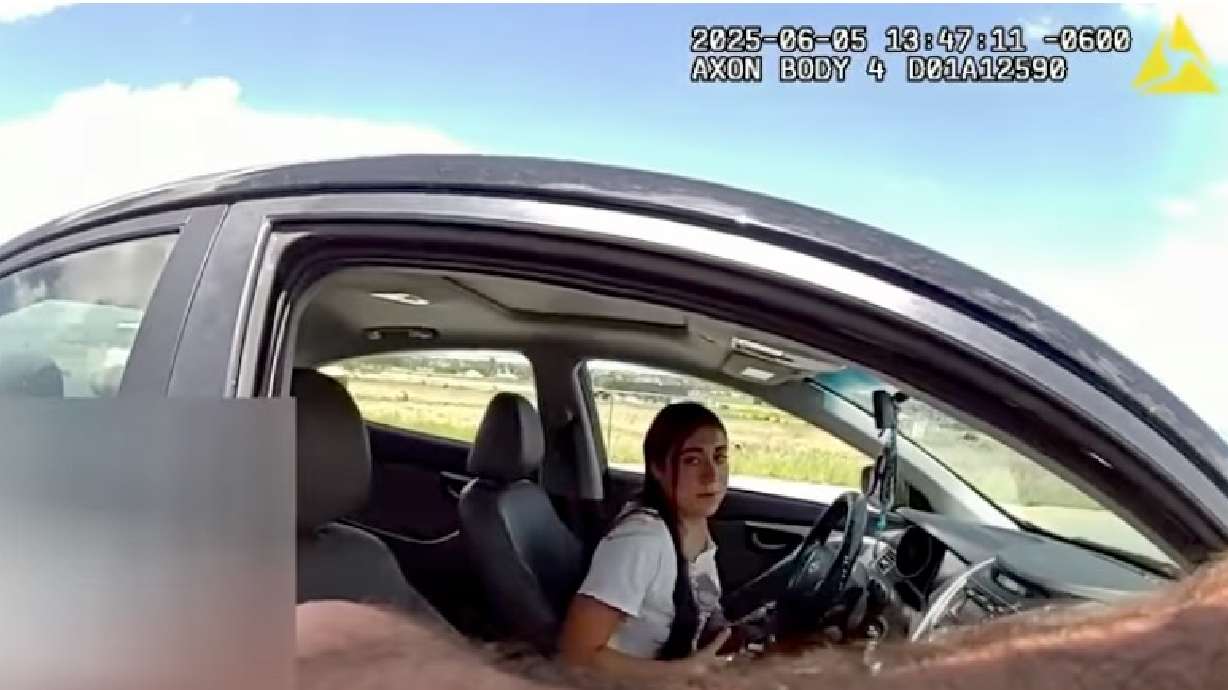DENVER — The American Civil Liberties Union in Colorado is suing federal immigration officials on behalf of a Brazilian immigrant in Utah and several others, saying their arrests underscore what the civil rights group believes to be “illegal and discriminatory” behavior by immigration authorities.
The experiences of Caroline Dias Goncalves and three others singled out in the lawsuit “are not unique,” it reads. “They reflect an unlawful practice that immigration officers rely on in their enforcement operations across the country and throughout Colorado: Make warrantless arrests without the requisite probable cause determinations regarding legal status and flight risk.”
The lawsuit, filed Oct. 9 in U.S. District Court in Denver, asks the court to order immigration authorities to halt such arrests if they don’t first determine if targeted immigrants are in the country illegally and pose a flight risk, as outlined in U.S. law. Dias is a student at the University of Utah, and she garnered headlines in Utah and beyond in June after she was detained by immigration authorities while driving through Colorado and placed in a detention facility for 15 days. She came to the country from Brazil when she was 7 years old and has been living with her family in Utah.
The complaint, more broadly, also charges Immigration and Customs Enforcement agents with “indiscriminately stopping and arresting people with brown skin in their mission to meet the (Trump) administration’s ramped-up enforcement demands.”
A press release the ACLU of Colorado issued when it filed its lawsuit contained more pointed language, saying immigration agents “arrest and detain people because of their skin color, accent or perceived nationality.” In a statement Monday, Tricia McLaughlin, spokeswoman for the U.S. Department of Homeland Security, took umbrage with the characterization, rebuffed the charges and defended the practices of federal immigration agents.
“Allegations that DHS law enforcement officers engage in ‘racial profiling’ are disgusting, reckless and categorically false. What makes someone a target for immigration enforcement is if they are illegally in the U.S. — not their skin color, race or ethnicity,” she said. “Under the 4th Amendment of the U.S. Constitution, DHS law enforcement uses ‘reasonable suspicion’ to make arrests. There are no ‘indiscriminate stops’ being made.”
The ACLU seeks a preliminary injunction ordering a halt to what it believes to be unlawful, warrantless arrests, as the broader lawsuit is resolved and class certification is granted, allowing additional people to join the lawsuit as plaintiffs. As of Monday, the defendants — Department of Homeland Security Kristi Noem, Acting Immigration and Customs Enforcement Director Todd Lyons, and Robert Guadian, director of the Denver field office of Immigration and Customs Enforcement — had not yet formally responded to the lawsuit.
‘Race-baiting opportunism’
Dias was initially stopped by a sheriff’s deputy in Colorado on June 5 for driving too close to a semitruck. The deputy let her go with a warning, but not before learning via a check with federal authorities that she had overstayed the terms of the visa allowing her to enter the United States and advising federal authorities of her whereabouts. Soon after he released her, Dias was arrested by Immigration and Customs Enforcement agents and subsequently placed in an immigration detention facility in Aurora.
The case caused an uproar, in part because of charges by Colorado Attorney General Phil Weiser that the deputy, Alexander Zwinck, violated a Colorado law that limits the ability of state employees to cooperate with federal immigration officials. The ACLU lawsuit said Zwinck has since resigned his post with the Mesa County Sheriff’s Office.
Specific to the lawsuit, the ACLU charged that immigration officials arrested Dias without a warrant and without evaluating her flight risk, violating federal law. Three other plaintiffs in the suit allegedly faced similar handling, and the ACLU charges that their treatment is representative of other immigrants’ experiences.
“ICE agents arrested each of them without a warrant and without any evaluation that they were likely to flee before a warrant could be obtained. If they had, they would have learned that each individual has lived in their respective communities for years, has deep family or community ties, has a long history of local employment or schooling and presents no likelihood of escape, let alone probable cause,” the lawsuit reads.
Trump has prioritized detention and deportation of immigrants in the country illegally, and the lawsuit charges that agents collectively face a quota of 3,000 immigration-related arrests per day, which has factored into their actions.
Read more:
“To reach that number, top White House aide Stephen Miller directed immigration enforcement agents to change their approach to arrests in the field. These agents, according to the White House, should no longer conduct targeted and investigation-based operations. Instead, they should ‘just go out there and arrest’ in public spaces,” the lawsuit reads.
McLaughlin, for her part, said the charges the ACLU is levying figure in the hostility immigration agents face around the country.
“This type of garbage is directly contributing to ICE officers facing a 1,000% increase in assaults against them, as well as months of repeated attacks on ICE facilities like the fatal one in Dallas,” she said, referencing a deadly Sept. 24 attack on the agency’s office in the Texas city. “Race-baiting opportunism in the form of a baseless lawsuit is no better than when it comes from politicians or activists.”
Dias is continuing her university studies, but as a part-time, online student, according to the lawsuit.
The Key Takeaways for this article were generated with the assistance of large language models and reviewed by our editorial team. The article, itself, is solely human-written.
